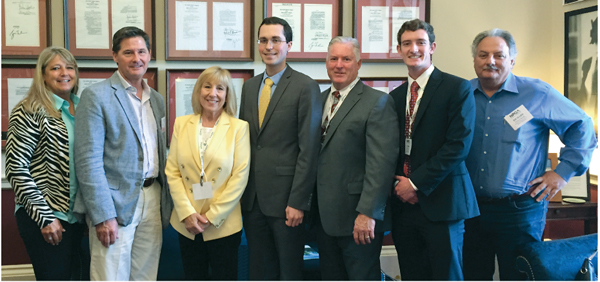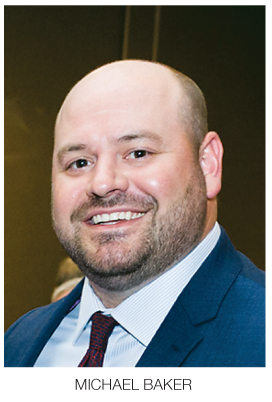Friday, June 14, 2019
When a bill that may affect propane marketers was introduced in the California legislature recently, a member of a legislator’s staff reached out to the Western Propane Gas Association (WPGA). That contact was a direct result of a volunteer meeting held during the state’s Propane Day, says Joy Alafia, president and CEO of WPGA. On that day in March, she and a number of propane marketers had visited with Sacramento legislators.
 “Some members may feel that industry advocacy days are a perfunctory task, but representatives are listening, taking notes, and in some instances, taking action as a result of our engagement,” Alafia recently told BPN.
“Some members may feel that industry advocacy days are a perfunctory task, but representatives are listening, taking notes, and in some instances, taking action as a result of our engagement,” Alafia recently told BPN.
“Some of our members have had long-standing relationships with their legislators, and we can count on these officials to understand our story,” she added. “Also, you never know what doors members can open by meeting with representatives.”
At the national level, too, strong relationships with legislators are important. Michael Baker, director, legislative affairs, at the National Propane Gas Association (NPGA), said that while he is proud of the work NPGA staff does year-round to stay in touch with legislators on all issues of importance to the propane industry,
he feels there is nothing more powerful than industry members meeting directly with legislators and staff.
 “There are many industries that can’t get anywhere near the membership participation in congressional outreach who are impressed by our Propane Days event each year,” Baker said, speaking of the annual event held in Washington, D.C. “We work hard to stay in touch as much as possible on Capitol Hill. These visits from the membership get attention and get action.”
“There are many industries that can’t get anywhere near the membership participation in congressional outreach who are impressed by our Propane Days event each year,” Baker said, speaking of the annual event held in Washington, D.C. “We work hard to stay in touch as much as possible on Capitol Hill. These visits from the membership get attention and get action.”
Cindy Belmont (Delta Liquid Energy, Paso Robles, Calif.), chair of NPGA’s governmental affairs committee, noted that onsite events such as open houses and plant tours are another way to build relationships with legislators. “Building the relationship and rapport is important, more so than exactly how you do it,” Belmont said. “You may not have a major issue you are seeking action on at all times, but a good relationship helps you to get action when you do.” (Belmont, third from left in photo above, is shown with part of the California contingent visiting Capitol Hill during Propane Days 2018.)
Tom Jaenicke (ATomiK Creative Solutions, Charlevoix, Mich.), immediate past chairman of the governmental affairs committee, has also found that to be true. “If you know the congressperson personally, you are going to be much more likely to be able to successfully ask for a specific action,” he said. “If you don’t know them personally, the next best thing is to get to know them. This could be through helping with their reelection or inviting them to an event such as an open house at your plant.”
According to Baker, there are four key steps in every congressional office visit. First is who you are: You have a unique story to tell and should start each visit with proper introductions not only of who you are, but also the role you play in the propane industry. Second are the issues: What are the issues that the congressperson needs to hear about from the constituent? Third is the impact of legislation: You need to have evidence of how current laws impact the congressional district. Fourth is the ask: You need to make clear the action you seek and ask them for that action.
Getting Ready
Belmont said it’s important to be prepared with the information you’ll need. “It’s very important to be well-versed in all aspects of the issues you will be talking to representatives about,” she said. “It’s also very important to know as much as possible about the Congress member.”
She stressed that knowing in advance where the Congress member stands on key issues is extremely useful to best craft the message you want to convey. “This will very much determine the order of items you want to talk about,” Belmont said. “If the Congress member has a stronger passion about an issue that ties to the third item on your list, that issue likely becomes the first issue for that visit. It will, of course, then affect how you make your case as you have knowledge of where they already stand.”
 Alafia said WPGA provides fact sheets and a list of bills that the association supports or opposes to help marketers prepare for California’s Propane Day. “While WPGA may have a priority, volunteers in the meetings often discover what bills resonate with the representative,” she added. “Our members are nimble and can adapt their talking points to address the legislator’s interest.”Dressing the part is also key to success when visiting legislator’s offices. “Proper business attire is a must,” Jaenicke said. “It is a business meeting and you will be taken more seriously if you are dressed in business attire.”
Alafia said WPGA provides fact sheets and a list of bills that the association supports or opposes to help marketers prepare for California’s Propane Day. “While WPGA may have a priority, volunteers in the meetings often discover what bills resonate with the representative,” she added. “Our members are nimble and can adapt their talking points to address the legislator’s interest.”Dressing the part is also key to success when visiting legislator’s offices. “Proper business attire is a must,” Jaenicke said. “It is a business meeting and you will be taken more seriously if you are dressed in business attire.”
Allocating Time, Resources
Jaenicke also feels it is best to use time and resources wisely when arranging numerous meetings with legislators. “If you have a dozen people, that is really more than necessary for a visit to a congressional office,” he said. “There will barely be time for introductions and finding everyone a place to sit. You want to get through the items you came to talk about and a group that is too large will hinder that. You will be more effective splitting your group of 12 into two or three groups in order to make more contacts.”
Alafia said WPGA tries to line up members with their respective legislators. “Elected officials want to hear from their constituents, particularly since they’re the ones with the power to vote the respective legislator into office,” she said.
 “Next, we try to align based on interest and the strength of our volunteers. For example, if there’s a major hospital in an area, and a retailer has experience with autogas shuttle vehicles for hospitals, we would like someone to tell that story firsthand. Similarly, some California legislators want to hear from women. We’re proud of the fact that we have successful, woman-owned propane companies, and they too can share their unique perspective with legislators. Ultimately it comes down to opportunities for both a human connection and voting relevance with our representatives.”
“Next, we try to align based on interest and the strength of our volunteers. For example, if there’s a major hospital in an area, and a retailer has experience with autogas shuttle vehicles for hospitals, we would like someone to tell that story firsthand. Similarly, some California legislators want to hear from women. We’re proud of the fact that we have successful, woman-owned propane companies, and they too can share their unique perspective with legislators. Ultimately it comes down to opportunities for both a human connection and voting relevance with our representatives.”
Belmont noted that in her home state, many representatives have a lot of counties in which 20% or more of the houses have propane gas. “The representatives of these counties, whether in the statehouse or national office, will be more interested in propane,” she said. “Nonetheless, don’t forget they all have a vote and with cylinders, forklifts, and autogas, even the most urban counties have propane impacting the economy to some extent every day of the week. And regardless of who you meet with, when you meet with them, stay focused. You only have a finite amount of time to deliver your important message.”
Open houses and plant tours are another way to build relationships with legislators as well as their working knowledge of the propane industry. A number of retailers will make an open house event an opportunity to educate elected officials as well as the public about the many uses for propane with such props as school buses, trucks, appliances, forklifts, and other things that run efficiently on propane.
“They will be very open to attending an event at a business that has an economic impact on the community it serves,” Belmont said. “If the event will provide a forum for them to interact with other constituents, that is great too.”
Jaenicke, too, said legislators and staff members want to meet with people in the district and learn how they are affected by issues. “First and foremost, Congress members want to hear directly from their constituents,” he said. “They want to know what is on the mind of the people in your district.”
Alafia suggested that marketers follow up with legislators after a meeting of any sort. “We like to send personal thank-you cards as an added touch,” she said. “It also provides an opportunity to reiterate some of the points made to keep them top-of-mind. My final advice for members is to relax and have fun! You’d be surprised as the ‘propane expert’ how much members can teach legislators on the overall value of propane in changing lives for Americans with affordable, clean energy.”
 “Some members may feel that industry advocacy days are a perfunctory task, but representatives are listening, taking notes, and in some instances, taking action as a result of our engagement,” Alafia recently told BPN.
“Some members may feel that industry advocacy days are a perfunctory task, but representatives are listening, taking notes, and in some instances, taking action as a result of our engagement,” Alafia recently told BPN. “Some of our members have had long-standing relationships with their legislators, and we can count on these officials to understand our story,” she added. “Also, you never know what doors members can open by meeting with representatives.”
At the national level, too, strong relationships with legislators are important. Michael Baker, director, legislative affairs, at the National Propane Gas Association (NPGA), said that while he is proud of the work NPGA staff does year-round to stay in touch with legislators on all issues of importance to the propane industry,
he feels there is nothing more powerful than industry members meeting directly with legislators and staff.
 “There are many industries that can’t get anywhere near the membership participation in congressional outreach who are impressed by our Propane Days event each year,” Baker said, speaking of the annual event held in Washington, D.C. “We work hard to stay in touch as much as possible on Capitol Hill. These visits from the membership get attention and get action.”
“There are many industries that can’t get anywhere near the membership participation in congressional outreach who are impressed by our Propane Days event each year,” Baker said, speaking of the annual event held in Washington, D.C. “We work hard to stay in touch as much as possible on Capitol Hill. These visits from the membership get attention and get action.”Cindy Belmont (Delta Liquid Energy, Paso Robles, Calif.), chair of NPGA’s governmental affairs committee, noted that onsite events such as open houses and plant tours are another way to build relationships with legislators. “Building the relationship and rapport is important, more so than exactly how you do it,” Belmont said. “You may not have a major issue you are seeking action on at all times, but a good relationship helps you to get action when you do.” (Belmont, third from left in photo above, is shown with part of the California contingent visiting Capitol Hill during Propane Days 2018.)
Tom Jaenicke (ATomiK Creative Solutions, Charlevoix, Mich.), immediate past chairman of the governmental affairs committee, has also found that to be true. “If you know the congressperson personally, you are going to be much more likely to be able to successfully ask for a specific action,” he said. “If you don’t know them personally, the next best thing is to get to know them. This could be through helping with their reelection or inviting them to an event such as an open house at your plant.”
According to Baker, there are four key steps in every congressional office visit. First is who you are: You have a unique story to tell and should start each visit with proper introductions not only of who you are, but also the role you play in the propane industry. Second are the issues: What are the issues that the congressperson needs to hear about from the constituent? Third is the impact of legislation: You need to have evidence of how current laws impact the congressional district. Fourth is the ask: You need to make clear the action you seek and ask them for that action.
Getting Ready
Belmont said it’s important to be prepared with the information you’ll need. “It’s very important to be well-versed in all aspects of the issues you will be talking to representatives about,” she said. “It’s also very important to know as much as possible about the Congress member.”
She stressed that knowing in advance where the Congress member stands on key issues is extremely useful to best craft the message you want to convey. “This will very much determine the order of items you want to talk about,” Belmont said. “If the Congress member has a stronger passion about an issue that ties to the third item on your list, that issue likely becomes the first issue for that visit. It will, of course, then affect how you make your case as you have knowledge of where they already stand.”
 Alafia said WPGA provides fact sheets and a list of bills that the association supports or opposes to help marketers prepare for California’s Propane Day. “While WPGA may have a priority, volunteers in the meetings often discover what bills resonate with the representative,” she added. “Our members are nimble and can adapt their talking points to address the legislator’s interest.”Dressing the part is also key to success when visiting legislator’s offices. “Proper business attire is a must,” Jaenicke said. “It is a business meeting and you will be taken more seriously if you are dressed in business attire.”
Alafia said WPGA provides fact sheets and a list of bills that the association supports or opposes to help marketers prepare for California’s Propane Day. “While WPGA may have a priority, volunteers in the meetings often discover what bills resonate with the representative,” she added. “Our members are nimble and can adapt their talking points to address the legislator’s interest.”Dressing the part is also key to success when visiting legislator’s offices. “Proper business attire is a must,” Jaenicke said. “It is a business meeting and you will be taken more seriously if you are dressed in business attire.”Allocating Time, Resources
Jaenicke also feels it is best to use time and resources wisely when arranging numerous meetings with legislators. “If you have a dozen people, that is really more than necessary for a visit to a congressional office,” he said. “There will barely be time for introductions and finding everyone a place to sit. You want to get through the items you came to talk about and a group that is too large will hinder that. You will be more effective splitting your group of 12 into two or three groups in order to make more contacts.”
Alafia said WPGA tries to line up members with their respective legislators. “Elected officials want to hear from their constituents, particularly since they’re the ones with the power to vote the respective legislator into office,” she said.
 “Next, we try to align based on interest and the strength of our volunteers. For example, if there’s a major hospital in an area, and a retailer has experience with autogas shuttle vehicles for hospitals, we would like someone to tell that story firsthand. Similarly, some California legislators want to hear from women. We’re proud of the fact that we have successful, woman-owned propane companies, and they too can share their unique perspective with legislators. Ultimately it comes down to opportunities for both a human connection and voting relevance with our representatives.”
“Next, we try to align based on interest and the strength of our volunteers. For example, if there’s a major hospital in an area, and a retailer has experience with autogas shuttle vehicles for hospitals, we would like someone to tell that story firsthand. Similarly, some California legislators want to hear from women. We’re proud of the fact that we have successful, woman-owned propane companies, and they too can share their unique perspective with legislators. Ultimately it comes down to opportunities for both a human connection and voting relevance with our representatives.”Belmont noted that in her home state, many representatives have a lot of counties in which 20% or more of the houses have propane gas. “The representatives of these counties, whether in the statehouse or national office, will be more interested in propane,” she said. “Nonetheless, don’t forget they all have a vote and with cylinders, forklifts, and autogas, even the most urban counties have propane impacting the economy to some extent every day of the week. And regardless of who you meet with, when you meet with them, stay focused. You only have a finite amount of time to deliver your important message.”
Open houses and plant tours are another way to build relationships with legislators as well as their working knowledge of the propane industry. A number of retailers will make an open house event an opportunity to educate elected officials as well as the public about the many uses for propane with such props as school buses, trucks, appliances, forklifts, and other things that run efficiently on propane.
“They will be very open to attending an event at a business that has an economic impact on the community it serves,” Belmont said. “If the event will provide a forum for them to interact with other constituents, that is great too.”
Jaenicke, too, said legislators and staff members want to meet with people in the district and learn how they are affected by issues. “First and foremost, Congress members want to hear directly from their constituents,” he said. “They want to know what is on the mind of the people in your district.”
Alafia suggested that marketers follow up with legislators after a meeting of any sort. “We like to send personal thank-you cards as an added touch,” she said. “It also provides an opportunity to reiterate some of the points made to keep them top-of-mind. My final advice for members is to relax and have fun! You’d be surprised as the ‘propane expert’ how much members can teach legislators on the overall value of propane in changing lives for Americans with affordable, clean energy.”

